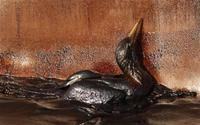Gasoline Liars Try Once Again to Derail American Energy Independence
 Wildlife, as the oil-gasoline industry would like to see it |
Anti-American group proudly brags that they caused more than 22,000 Americans to e-mail President Obama in an attempt to coerce him to 'Say NO to Untested E15'
EDITOR'S NOTE: A mis-named group, "FollowTheScience.org," issued the following
press release today. The AutoChannel is publishing the release to keep their misguided activities
before the public. As we have stated previously, the claims made by this gasoline industry sponsored group
are all lies and gross misconceptions. They are as much an enemy to the United States as any gang of terrorists.
SEE: Gasoline Liars Engage in Catfight to Try and Keep Ethanol Off The U.S. Market
WASHINGTON - October 6, 2010: More than 22,000 Americans have e-mailed President Obama urging him to stop the Environmental Protection Agency from approving a 50 percent increase in the amount of ethanol in gasoline until comprehensive, independent and objective scientific testing can show that higher ethanol levels will not increase air pollution, harm engines or raise consumer safety issues.
The results of the 10-day e-mail campaign called "Say NO to Untested E15" were announced today. The e-mail campaign was organized by a diverse group of environmental, consumer, food, engine manufacturing and other industry organizations that are often at odds on many issues but are united in their opposition to higher ethanol levels that have not been adequately tested.
The groups - and the people e-mailing President Obama - have raised serious concerns about the harmful effects that increasing the amount of ethanol in gasoline could have on engine performance, safety, the environment and food prices.
There has not been adequate testing to determine if increased ethanol in gasoline would cause costly damage to engines in the cars, boats, motorcycles, ATVs, lawn mowers and other outdoor equipment powered by gasoline engines that millions of Americans use every day, the groups have said.
EPA, which has been pressured by some in the ethanol industry to increase the amount of ethanol in gasoline from the current 10 percent (E10) to 15 percent (E15), has stated it will announce a decision later this month on whether to approve the use of E15 in late-model cars. All indications are that EPA is moving toward approval of the fuel mixture.
Individuals visiting the Web site www.FollowTheScience.org and Web sites of affiliated organizations in the Say NO to Untested E15 campaign sent the e-mails to President Obama urging him to intercede with EPA to prevent hasty and premature approval of E15.
Organizations backing the campaign earlier contacted members of Congress and other federal officials to raise their concerns. In addition, the campaign is sponsoring an ad that will appear Thursday in The Washington Post and Politico urging President Obama to respond to the e-mails sent to him and protect the American people from untested E15. The ad can be viewed here and at www.FollowtheScience.org.
The ad states in part: "Mr. President, EPA should wait for the completion of thorough and objective scientific tests, and act to protect our safety and our environment. We shouldn't be asked to pump first and ask questions later."
The Say NO to Untested E15 campaign points out that ethanol burns hotter than pure gasoline, corrodes soft metals, and damages plastics and rubber. As a result, more ethanol in gasoline could have serious effects on engine performance and raises potential safety concerns.
Some groups have asserted that the demand for more corn to produce ethanol has serious environmental effects and raises both food and feed prices. In addition, since ethanol produces less energy than gasoline, it drives down the number of miles a vehicle gets per gallon - meaning drivers must buy fuel more often. Misfueling with a new higher ethanol fuel mix ending up in the wrong engine and causing damage is another major concern.


